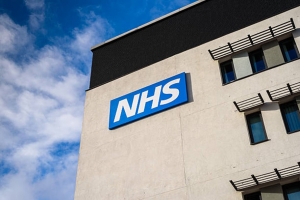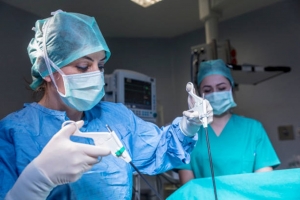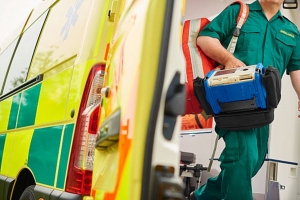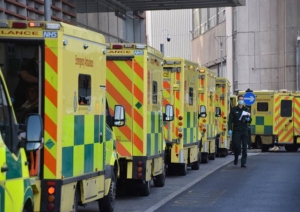Delays Hit England’s Hospital Building Programme
Several hospital construction projects in England are facing significant delays, with some set to wait as long as 14 years before work begins, the government has confirmed. Health Secretary Wes Streeting has blamed the Conservatives' 2019 election pledge to deliver 40 new hospitals by 2030 as "unaffordable," accusing the Tories of giving "false hope" to communities. Labour, which had already greenlit 21 projects in September, announced a further seven priority schemes this week but confirmed that 18 others would be delayed, with construction now unlikely to start until 2032 or later.
The hospital-building programme, initially promising 40 new facilities, has grown over time, adding to its complexity and cost. Labour’s priority list includes replacing older facilities built with reinforced autoclaved aerated concrete (Raac), a material raising safety concerns. While Labour has committed £15 billion over the next five years to fund the revised programme, critics, including Shadow Health Secretary Ed Argar, have accused the government of breaking promises and failing to prioritise the urgent need for new NHS buildings.
Delays have sparked frustration among NHS trusts and campaigners, who warn that further postponements could have serious consequences for patient care. Helen Morgan of the Liberal Democrats called the situation a "double betrayal," criticising both the Conservatives' initial promise and Labour's handling of the revised programme.
The government insists its revised timeline is "honest and deliverable," with construction on some projects starting by 2029. However, for many communities, delays stretching into the 2030s remain a bitter pill to swallow, raising concerns about the long-term impact on healthcare infrastructure and services.
Mental Health Assessment Waiting Lists Soar Amid Rising Demand
The Cambridgeshire and Peterborough NHS Foundation Trust (CPFT) has reported a significant increase in the number of people awaiting mental health assessments, with waiting lists growing from 6,700 in December 2021 to 11,600 by December 2024. Rising demand for services such as ADHD, autism, and eating disorder assessments has been highlighted as a key factor. A report to county councillors this week noted the challenge of managing this surge while maintaining timely patient care.
CPFT stated that, despite the rise, its waiting list figures remain below the regional average. However, eating disorder services have been particularly strained, receiving 138 referrals per month and struggling to meet targets due to poor referral details and difficulties contacting patients to arrange appointments. The trust has also faced ongoing delays in discharging mental health patients, with an average of 14 patients each month ready to leave hospital but unable to do so promptly.
In addition to tackling waiting lists, CPFT is focusing on suicide prevention and improving processes for learning from deaths. While its overall Care Quality Commission (CQC) rating is "good," adult mental health services were rated as "requires improvement" in December. The trust is taking these findings seriously, implementing initiatives to address shortcomings.
Newly appointed Chief Executive Steve Grange is set to outline CPFT’s future strategy amid financial pressures, including an annual deficit of £7.23m, exceeding the planned £4.07m. The trust’s priorities and challenges, including service delivery and financial stability, will be discussed in this week’s meeting.
UK Nurse Undergoes Groundbreaking Eye Socket Surgery to Remove Tumour
A Leeds nurse has made medical history as the first person in the UK to have a tumour removed through her eye socket using keyhole surgery. Ruvimbo Kaviya, 40, underwent the procedure to remove a meningioma located in the cavernous sinus, a hard-to-reach space beneath the brain and behind the eyes, which would previously have been considered inoperable.
Specialists at Leeds Teaching Hospitals NHS Trust prepared for months, practising the surgery with 3D technology. Traditional methods would have involved highly invasive brain surgery, requiring the removal of a large portion of the skull and carrying significant risks. The new approach allowed surgeons to access the tumour directly, minimising complications.
Ms Kaviya, a mother-of-three, had been living with debilitating headaches described as “electric shocks” in her face, which left her unable to eat or brush her teeth. Despite being told the procedure carried risks, she agreed to it due to the severity of her pain. The operation, performed in February last year, lasted just three hours, and she was walking the same day.
Neurosurgeon Asim Sheikh highlighted how advances in technology are revolutionising treatments for previously untreatable conditions. The surgical team rehearsed using a 3D model of Ms Kaviya’s skull, prepared by biomedical engineer Lisa Ferrie. Ms Kaviya, now fully recovered and back at work, said she was amazed by the quick recovery, adding that the surgery left only a small scar near her eye.
UK to Undertake Extensive Pandemic Preparedness Exercise
Emergency services, local councils, and government representatives are set to participate in a comprehensive multi-day pandemic preparedness drill later this year. The exercise, expected to take place in autumn, will involve thousands of individuals across the UK. This initiative, announced by Minister Pat McFadden, aims to strengthen the nation’s readiness for potential future health crises.
The exercise responds to recommendations from the Covid-19 Inquiry, which highlighted significant shortcomings in the UK’s handling of the pandemic. Baroness Hallett, chair of the inquiry, described the UK as “ill-prepared” for Covid-19 and criticised its failure to protect citizens. The upcoming drill will be the first large-scale pandemic readiness test in nearly a decade, designed to assess plans, processes, and capabilities in dealing with emerging threats. Findings from the exercise will be made public, aligning with the inquiry’s call for transparency.
Other resilience measures include a nationwide test of the emergency alert system, which has already been used four times since its 2023 launch, and the creation of a "vulnerability map" to identify at-risk populations. The government also plans to train 4,000 individuals annually through a new UK Resilience Academy, set to open in April.
Minister, Mr McFadden, stressed the importance of learning from past mistakes, acknowledging that future crises may differ from the last. Strengthening the nation’s resilience, he noted, requires addressing systemic weaknesses, such as public service capacity and health inequalities, as highlighted in the inquiry’s report.
NHS Faces Winter Pressures on Par with Pandemic Levels
Accident and emergency departments are experiencing pressures comparable to the height of the Covid pandemic, according to NHS leaders. Rising flu cases, cold weather, and increasing demand have created "exceptional pressure" on hospitals, with NHS England’s medical director, Prof Sir Stephen Powis, describing the situation as "mammoth." Frontline staff report working conditions reminiscent of the pandemic's peak.
Hospital admissions for flu have surged, with over 5,400 patients hospitalised daily in England last week, a rise of 1,000 compared to the previous week. This flu season is among the most severe in years, with patient numbers triple those of last winter. Critical incidents have been declared by about 20 NHS trusts, while emergency services in Scotland and Wales face significant strain, with long ambulance and A&E delays.
NHS Providers interim chief executive Saffron Cordery warned that challenges were likely to intensify before improving. Ambulance response times remain under scrutiny, with average waits for life-threatening emergencies exceeding targets in December. Meanwhile, over 70% of A&E patients were not treated or admitted within the four-hour target.
Dr Tim Cooksley of the Society for Acute Medicine labelled the crisis "appalling," attributing it to a persistent lack of year-round capacity rather than seasonal pressures alone. He urged that systemic issues be addressed, emphasising the toll on both patients and staff amidst these severe conditions.
Glasgow Opens UK’s First Drug Consumption Room
The Thistle, the UK’s first drug consumption room, is set to open in Glasgow's east end, aiming to address the city's significant drug-related challenges. Funded by the Scottish government, the facility provides a supervised environment for individuals to inject drugs they bring with them, such as heroin or cocaine, under medical oversight. The initiative seeks to reduce overdoses, limit public drug use, and improve safety in the local community.
The project was made possible by a shift in prosecution policy from Scotland’s senior legal authority, allowing users to possess drugs within the facility without facing charges. While drug laws remain reserved to Westminster, the UK government has opted not to obstruct the Glasgow initiative. The centre will operate daily, offering eight injection booths alongside services such as medical consultations, recovery spaces, and access to basic amenities.
The facility is situated in a high-need area and draws on lessons from similar initiatives in countries like Switzerland and Canada. Its approach focuses on harm reduction, targeting a concentrated group of public drug users. Health experts hope the project will reduce drug-related harm, litter, and public injecting.
Despite its goals, the centre has faced criticism from some residents and organisations, who argue resources should be directed towards long-term recovery services. However, officials assert the centre is a vital step in engaging vulnerable individuals and addressing immediate public health risks.
New NHS Plan Aims to Tackle Backlog and Reduce Waiting Lists
The government has announced plans to expand community diagnostic hubs and increase the use of private healthcare providers to reduce NHS waiting lists in England. With 7.5 million patients currently awaiting treatment and nearly 60% waiting longer than the 18-week target, the government aims to cut the list significantly by March 2026. Community hubs will offer faster, local treatment, while private clinics will focus on procedures like joint replacements and gynaecological care.
A key component of the plan includes enabling GPs to refer patients directly to diagnostic centres without prior consultations with specialists. Additionally, surgical hubs will be created for routine procedures, such as cataract surgeries, ensuring these services are not disrupted by emergency cases. Officials also aim to free up one million unnecessary follow-up appointments annually, allowing resources to be redirected to those in greater need.
Patients will have more control over their healthcare through the NHS App, which will facilitate booking appointments and managing consultations. These changes are expected to create two million additional appointments per year. Amanda Pritchard, NHS England Chief Executive, highlighted the plan’s potential to boost efficiency and convenience, empowering patients while delivering millions more tests and operations.
However, concerns remain about staffing shortages and available resources. Medical professionals, including Professor Phil Banfield of the BMA, question whether the workforce can meet rising demands, stressing the need for adequate facilities, trained staff, and sufficient funding to achieve these ambitious targets.
NHS App Upgrade Aims to Reduce Waiting Times
Plans to enhance the NHS App in England will allow patients to book non-emergency treatments and manage appointments more easily. The upgrade, part of a broader government strategy, aims to reduce waiting times by enabling patients to choose from a range of providers, including private healthcare. The government is targeting a reduction in waiting lists, which currently stand at 7.5 million, and intends for nine out of ten patients to receive treatment within 18 weeks of referral by the next election.
Health Secretary Wes Streeting described the initiative as bringing the NHS "into the digital age," improving efficiency and empowering patients to take control of their care. The app will enable users to view appointments, book diagnostic tests, and receive updates on wait times. Hospitals will issue appointment reminders to minimise missed slots, while artificial intelligence will be trialled to identify patients requiring extra support.
Additional measures include expanding schemes that ensure patients are directed to the right care without unnecessary referrals, potentially reducing pressure on hospitals. GPs will also gain the ability to send patients directly for tests without consultant approval, expediting diagnosis and reducing delays.
Critics, including the British Medical Association, have raised concerns about potential inequalities for patients without access to digital devices. Meanwhile, healthcare leaders have emphasised the importance of addressing workforce shortages and investing in infrastructure to meet these ambitious goals.










